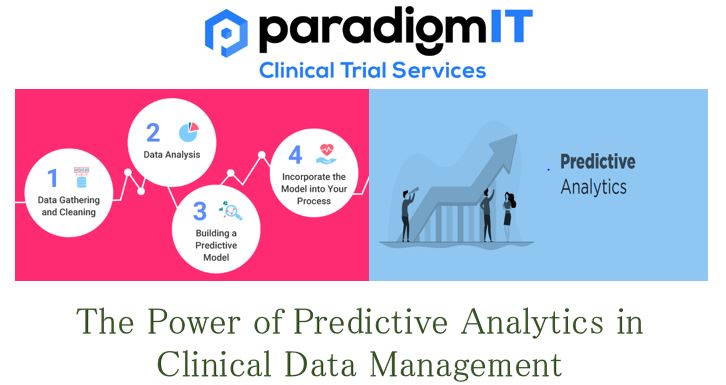Predication is the forecasting of future events based on previous similar patterns or models. Though it is not an easy task, science has always found a way to do it. Fred Hoyle (an English astronomer) put it crisply when he said, “Science is prediction, not explanation.” Technological advancement such as Artificial intelligence is transforming healthcare systems globally. Predictive analytics is one such technology that clinical researchers deploy to stay ahead of the curve. Through predictive analytics, clinicians can make better clinical decisions and respond better (rather than react) to healthcare crises.
Now, specifically looking at Predictive Analytics in Clinical Data Management, there seems to be a lot of scope for applications in this field. Complex clinical trial data sets can be subject to intelligent algorithms to gain previously unknown insights. With the help of such technology, one can solve some of the problems clinical researchers face. From Patient enrolment to drug-drug interactions to trial outcomes, predictive analytics has a role at each level of slicing of the clinical trial data.
The following are the most valuable uses of predictive analytics in Clinical Data Management,
- Patient Eligibility: Patient data from electronic health records and similar sources can predict the patient’s eligibility for trial enrolment. Clinical research data can predict the likelihood of dropouts and non-responders in the trial. Researchers can mitigate these challenges and plan their recruitment strategy based on such predictions.
- Trial Outcomes: Based on data such as medical history and results from previous patient cohorts, analytic modelling can help predict favourable or unfavourable trial outcomes. In turn, this leads to better planning and reduction of unnecessary expenses from trial failures.
- Patient risk Stratification: Predictive analytics can categorize patients into different risk groups based on their health conditions, lifestyle factors, and genetic predispositions. This risk stratification helps healthcare providers prioritize interventions for high-risk patients, ensuring they receive the necessary attention and resources to manage their health effectively.
- Drug Interactions and Adverse Events: Analysis of the clinical research data can provide advanced information about the potential side effects of the trial intervention. It predicts adverse reactions from different drug interactions in the trial course.
- Chronic Disease Management: For patients with chronic conditions, predictive analytics can monitor their health data over time and identify trends that may signal deterioration or exacerbation of their condition. This enables timely interventions, proactive management, and better control of chronic diseases.
- Predictive Maintenance: For medical equipment and devices, predictive analytics can be used to anticipate potential failures or maintenance needs based on usage patterns and sensor data. This proactive approach helps prevent equipment downtime, ensuring continuous and reliable healthcare services.
- Decision support for clinicians: Predictive analytics tools can provide clinicians with decision support, suggesting appropriate tests, treatments, or interventions based on patient data and best practice guidelines. This assistance can enhance clinical decision-making, leading to better patient outcomes.
In conclusion, predictive analytics can be a definite boon to the clinical research community. The power of predictive analytics lies in its ability to extract comprehensive insights from large volumes of existing clinical research data. It’s high time that clinical researchers tap into the potential of this technology to improve the success rate of clinical trials.
For more information –
Visit our website – www.paradigmit.com
Or you can write us at ask@paradigmit.com
Follow us for more – https://www.linkedin.com/company/paradigmittechnologyservices/?viewAsMember=true


